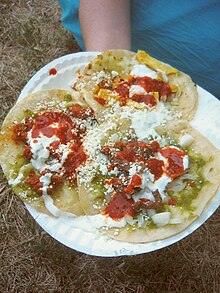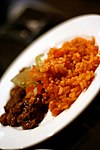Chalupa
 A plate of Chalupas | |
| Course | Lunch, dinner |
|---|---|
| Place of origin | Mexico |
| Region or state | Americas |
| Serving temperature | hot |
| Main ingredients | Masa, cheese, lettuce, salsa |
A chalupa (Spanish pronunciation: [tʃaˈlupa]) is a specialty dish of south-central Mexico, including the states of Hidalgo, Puebla, Guerrero, and Oaxaca. Chalupas are made by pressing a thin layer of masa dough around the outside of a small mold, in the process creating a concave container resembling the boat of the same name, and then deep frying the result to produce crisp, shallow corn cups. These are filled with various ingredients such as shredded chicken, pork, chopped onion, chipotle pepper, red salsa, and/or green salsa. They can in many cases resemble tostadas since both are made of a fried or baked masa-based dough.[1][2][3]
Traditional chalupas, as found in Cholula, Puebla, are small, thick, boat-shaped fried masa topped only with salsa, cheese and shredded lettuce. Other regions in Mexico add variations, which can include chorizo, pork, shredded chicken, or re-fried beans, in addition to the classic cheese, salsa, and lettuce toppings.[1] In other instances, the fried masa shape is round, resembling a tostada, with traditional chalupa toppings.[2]
In the United States
The widespread popularity of chalupas across Mexico has also influenced Mexican-style restaurant fare in the neighboring United States. Among notable examples in that country is the Taco Bell version, which unlike its Mexican version, is a thick, fried tortilla shell filled with either chicken or ground beef, sour cream, cheese, tomatoes, and shredded lettuce.[1]
See also
References
- ^ a b c Charles M. Tatum (2013). Encyclopedia of Latino Culture: From Calaveras to Quinceañeras. ABC-CLIO. pp. 451–454. ISBN 9781440800993. Retrieved 12 April 2016.
- ^ a b Nancy Zaslavsky (1997). A Cook's Tour of Mexico: Authentic Recipes from the Country's Best Open-Air Markets, City Fondas, and Home Kitchens. Macmillan. p. 171. ISBN 9780312166083. Retrieved 12 April 2016.
- ^ Diana Kennedy (2000). The Essential Cuisines of Mexico. New York: Clarkson Potter/Publishers. p. 33. ISBN 978-0-307-58772-5. Retrieved 23 January 2013.












